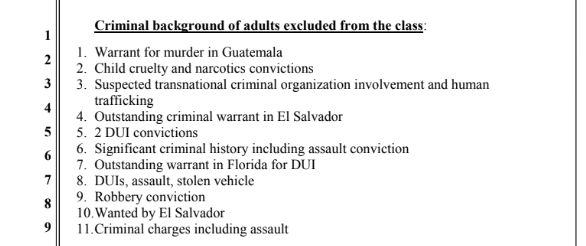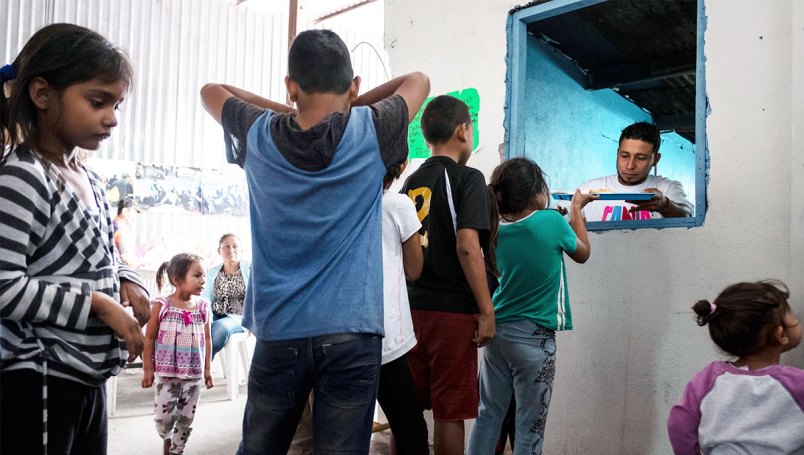The Trump administration is refusing to reunite nearly a dozen immigrant families with children younger than 5 based on the criminal record of the parent — even when the record in question involves a non-violent crime or even the lack of a conviction.
Attorneys challenging the separations and former DHS officials tell TPM that only a criminal record that indicates an imminent danger to the child should justify the continued separation, saying that records that would not have triggered removing the child from the parent in the first place in the past should not be used now to keep the family apart.
Attorneys for the American Civil Liberties Union, who won a national injunction against the Trump administration forcing them to reunite all of the roughly 3,000 families separated under the “zero tolerance” policy, also tell TPM that the administration has not yet given them concrete proof of the criminal records they are citing to deny reunification — making it impossible for them to investigate and contest their authenticity and severity.
The Trump administration has reunited just over half of the children younger than 5 who were taken from their parents — and is telling federal courts that the rest are either currently or permanently ineligible for reunification for a variety of reasons, including the criminal records of the parents involved.
In a filing to U.S. District Judge Dana Sabraw in San Diego, who issued the national injunction forcing the administration to reunite the families by July 26, the administration listed the allegations against the parents they believe are ineligible. While some appear to meet the bar for posing danger to the child, others involve outstanding warrants rather than convictions, some involve crimes like robbery and driving under the influence that would not normally justify separating a child and parent, and some vaguely cited a warrant or the individual being “wanted” for something in their home country and did not detail a conviction at all.

Under Judge Sabraw’s reunification order, any criminal record other than a charge for illegal entry into the U.S., no matter how minor, means a parent cannot be a part of the class action and is not entitled to be reunified by July 26. He emphasized, however, that the Trump administration cannot cite a parent’s low-level criminal history to permanently refuse to return their child.
“Just because you have a conviction, that doesn’t mean the government can take away your child forever,” Lee Gelernt, the ACLU’s lead attorney in the case, told TPM. “The conviction has to bear on your fitness to be a parent. If you stole a shirt 15 years ago, that has no bearing on your ability to parent. You are still entitled to get your child back. But if you’ve been convicted of child molestation, that is of course a different matter.”
A separate class action lawsuit against the administration brought by the Center for Human Rights and Constitutional Law says the due process rights of the separated parents are being violated because there is no way for them to challenge the Trump administration’s unilateral determination that they should not be reunified.
“ORR prolongs children’s detention on the ground that their parents or other available custodians are or may be unfit, while affording neither detained juveniles nor their proposed custodians a meaningful or timely opportunity to be heard regarding a proposed custodian’s fitness,” the group’s complaint reads. They add that the government’s standards for fitness are “are subject to change without prior notice or opportunity for comment.”
In interviews and press releases, the administration officials overseeing the reunifications have repeatedly cited the most serious of the criminal allegations.
“We save kids’ lives by keeping them from being with some really evil people,” Health and Human Services Secretary Alex Azar told CNN. In a statement sent out by HHS July 6, Azar said the administration is “working to protect the welfare of the children with whom we have been entrusted.”
A former senior DHS official told TPM, however, that the agency has never before separated families over minor offenses, and should not do so now.
“My understanding of prior practice is that immigration officials, ICE and [Border Patrol], by and large only separated children when there was some risk of imminent harm to the child or there was a real question about the relationship between the adult and the child — a fear based on evidence that the parent is not the parent,” he said. “The practice was not to separate because at point or another the parent had committed a crime.”
The official said that same standard should apply now since “they’re the ones who created the separation in the first place.”
But Gelernt predicts he and other attorneys will have to fight in court for those with non-violent convictions, to make sure that the undocumented parents have the same due process rights as U.S. citizens when it comes to having their child removed.
“If New York City couldn’t take a child away from a parent under city law for a certain type of offense, then it’s not enough to refuse to reunite these parents with their children,” he said. “Are there going to be fights with the government on what kind of criminal records count? Of course.”
Another looming problem, the ACLU says, is that the government has not given them documentation of the alleged criminal records, making it impossible for them to investigate their accuracy.
“They say there’s a warrant in a foreign country. Maybe there is, maybe not,” Gelernt told Judge Sabraw during Friday’s hearing. “And we need to be able to verify that they didn’t make any mistakes and that it’s the right person. For example, if it turns out it was Jose R. Martinez and not Jose A. Martinez with the criminal record, they should get the benefit of the court’s hard deadline.”







People need to go to prison for this.
This is an example of the “family values” the Republicans incessantly bray about? This is utterly despicable.
“> We save kids’ lives by keeping them from being with some really evil people,” Health and Human Services Secretary Alex Azar told CNN. In a statement sent out by HHS July 6, Azar said the administration is “working to protect the welfare of the children with whom we have been entrusted.”
Well they better keep those kids as far away from Donald Trump as possible.
We’re past civil complaints here, states should seriously entertain filing criminal charges now. Sessions is playing games to subvert judges orders, let him get handcuffed and hauled away, then he can know what “deterrence” means.
Yeah, I know it won’t happen, but I’d love to see it.
With all the crimes that Trump has committed over the years and all the parallel investigations of Trump and his crime syndicate )Cohen and Manafort have both been high ranking members of the Russian mob in the US for years…as has Trump)…
It’s time to rescue Baron Von Trump from Trump and Melania…they have committed high level crimes!
Plus with melania’s father being a high ranking member of the Slovenia communist party, that alone is justification to remove Trump’s children from the family and send them to a detention center in Texas! Take Trump’s 2 grease ball sons as well…throw them in jail!
Gotta be truly evil to drive under the influence.
Yup. Satan’s child, no doubt.